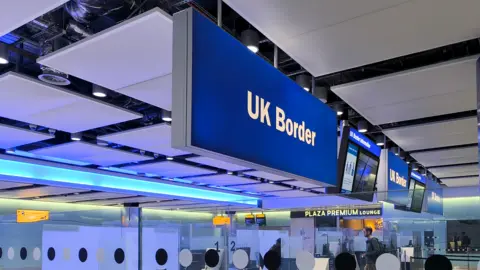Home Office 'not checking' when foreign worker visas expire
 Getty Images
Getty ImagesThe Home Office does not know whether foreign workers are leaving the UK or staying to work illegally after their visas expire, a cross-party committee of MPs has said.
The Public Accounts Committee (PAC), which scrutinises government spending, said the Home Office had failed to analyse exit checks since the skilled worker visa route was introduced in 2020 under the Conservatives.
Some 1.18 million people have applied to come to the UK via this route between its launch in December 2020 and the end of 2024.
The Home Office said it had inherited a "broken immigration system" and that it was working to "repair the public's trust".
The skilled worker visa route replaced the Tier 2 (General) work visa after the UK left the European Union.
The route was expanded in 2022 by the previous Conservative government to address skill shortages and job vacancies in health and social care in the wake of the Covid pandemic, driving net migration to record levels.
But the PAC has accused the Home Office of failing to gather "basic information" on whether people leave the UK after their visas expire and showing "little curiosity about how the route was operating".
Its report said the department still relied on airline passenger records to check if someone had left the country and that there had been no analysis of those records since 2020.
It added that the Home Office needed to set out what measures would be put in place to record when people had left the country.
The report also said there was "widespread evidence of workers suffering debt bondage, working excessive hours and exploitative conditions" and accused the department of being "slow and ineffective" to tackle exploitation.
In May, Home Secretary Yvette Cooper said the government would end overseas recruitment for care workers as part of the plans to curb near record net migration.
But she told BBC Breakfast on Friday that the report's conclusions were correct and that the system "hasn't been strong enough".
"Change doesn't happen at the flick of a switch," she said, echoing Sir Keir Starmer's victory speech comments last year.
Pressed on when the Home Office would be able to accurately monitor entry and exit to the country, she said "it does take a bit of time - a lot of that system is now in place."
The government plans to install biometric tests in the workplace to check whether an individual is living and working the UK legally via their fingerprints, she added.
"We're going to go substantially further," she said.
Home Office Permanent Secretary Dame Antonia Romeo has also said overstaying is a "problem" the department was "fixing".
But there is not "a huge amount of transparency" in how the Home Office helps people find new jobs, according to Dr Madeleine Sumption, director of the Migration Observatory at the University of Oxford.
She told BBC Radio 4's Today programme that their process, so far, doesn't seem to have been "hugely effective."
"I think this is going to be an issue for the Home Office for some time," she added.
A Home Office spokesperson said: "This report affirms again that the previous government's decision five years ago to relax visa controls on skilled workers helped to drive an unprecedented increase in the UK's level of net migration, with almost one million people coming here in 2023.
"We have rolled up our sleeves to fix the broken immigration system, suspending the highest total of skilled worker sponsor licenses since records began in 2012, raising the Skilled Worker threshold back to degree level and ending overseas recruitment to the care sector."
"With our Immigration Whitepaper we will deliver lower net migration, higher skills, backing British workers and repairing the public's trust."
